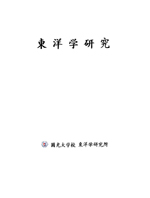풍수론의 음양오행사상에 대한 고찰
Contemplation on Yin-Yang and Five Elements of the Universe within the Theory of Feng Shui
- 원광대학교 동양학대학원
- 동양학연구
- 제12집
-
2016.02123 - 141 (19 pages)
- 25

우리 민족의 문화사에서 풍수지리는 인간의 삶과 죽음에 상당한 영향을 미친 사상이자 신앙이다. 풍수사상의 근본은 하늘과 땅, 사람이 삼여일체(三如一体)를 이루고자 함에 있고, 인후지덕(人厚之德)이면 천지상응(天地相應)이라 하여 진실 된 자세로 임할 것을 설명하고 있으며, 탄생과 함께 죽음, 영혼의 의미까지 풍수의 기운이 깊이 관여되어 있다. 그러나 고대로부터 현대까지 지형의 유기적인 상관관계를 살피어 이론으로 체계화 하였음에도 불구하고 길지(吉地)에 집, 도성, 무덤 등의 터로 사용하여 발복(發福)을 바랐다는 이유로 풍수의 이론이나 학설을 미신(迷信)으로 몰아가는 상황에서 풍수사상에 흐르고 있는 음양오행사상을 고찰해 봄으로 우리 선현들의 지혜와 풍수에 대해 학문적이고 이론적인 체계에 관해 새로운 시각을 갖도록 하고자 한다.
Feng Shui is a philosophical system and a religion that exerted a great influence on people’s lives and deaths in our cultural history. The fundamental principle of Feng Shui is to achieve unity of the sky, land and people. Feng Shui emphasizes the importance of taking a sincere attitude toward life, explaining that men with virtue are equivalent to the sky and land. The meaning of life, death and soul is also deeply associated with the energy (Qi) of Feng Shui. Despite the fact that Feng Shui has been developed as a systematic theory which looks into the topographic correlation, the theory of Feng Shui has been belittled as a superstition because it has been mainly used to situate auspicious sites for houses, capital cities or tombs with good Qi. Amid this widespread misunderstanding about Feng Shui, this study will attempt to take a new perspective on our ancestors’ wisdom and the academic and theoretical system of Feng Shui by contemplating Yin-Yang and Five Elements of the Universe, the founding theory of Feng Sui.
Ⅰ. 서론
Ⅱ. 풍수지리의 정의와 중심사상
Ⅲ. 음양오행의 이해
Ⅳ. 풍수지리와 음양오행과의 관계
Ⅴ. 결론
(0)
(0)